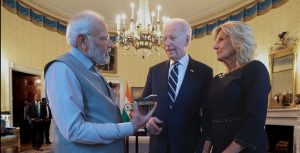UPSC 2015 topper
Tina Dabi’s sister Ria Dabi has cleared the prestigious civil services
examination, the results of which were declared on Friday. Six years after her
elder sister secured the first rank, becoming the first Dalit woman to top the
civil services exam, Ria Dabi secured all-India rank 15.
Also Read | UPSC: 761 candidates clear civil services exam. Meet the toppers
After the results
were announced, Tina Dabi, who is currently serving as the joint secretary
finance (tax) in the Government of Rajasthan, wrote in an Instagram post: “I am
delighted to share that my younger sister Ria Dabi has got rank 15 in UPSC 2020
exam.”
Both Tina and Ria
Dabi studied at Lady Shri Ram College under Delhi University. Speaking to the
Indian Express after the announcement of results, Ria Dabi said, “Caste system
is extremely rigid and I think it should not exist. I was 18 when my elder
sister came first in UPSC. It was highly motivating. But if you ask me who my
motivation is, I would say it’s my mother.”
Also Read | IAS officer Tina Dabi files complaint on 10 ‘fake’ Facebook accounts in her name
The Union Public
Service Commission (UPSC) declared its civil services examinations results for
2020 on Friday. A total of 761
candidates including 545 men and 216 women cleared the civil services examination
this year, the commission said in a statement. Thirteen men and 12 women are
among the top 25 rankers this time.
Also Read | IAS toppers, Tina Dabi and Athar Ali Khan, get divorced
Shubham Kumar from
Bihar, an IIT-Bombay alumnus, secured the top rank in the examination. Kumar,
who has a degree in civil engineering, is currently undergoing training as an
Indian Defence Accounts Service probationer in Pune.
Jasleen Awasthi,
who was ranked second and is the top-ranker among women, also has an
engineering degree. Awasthi did her BTech in Electrical Engineering from
Maulana Azad National Institute of Technology in Bhopal.
Ankita Jain was
ranked third.
The Union Public
Service Commission conducts the all-India civil services examination every year
to select candidates who will serve various wings of the country’s bureaucracy.
The examination is conducted in three stages, the first is a preliminary test,
next a descriptive ‘mains’ exam, followed by the interview.






